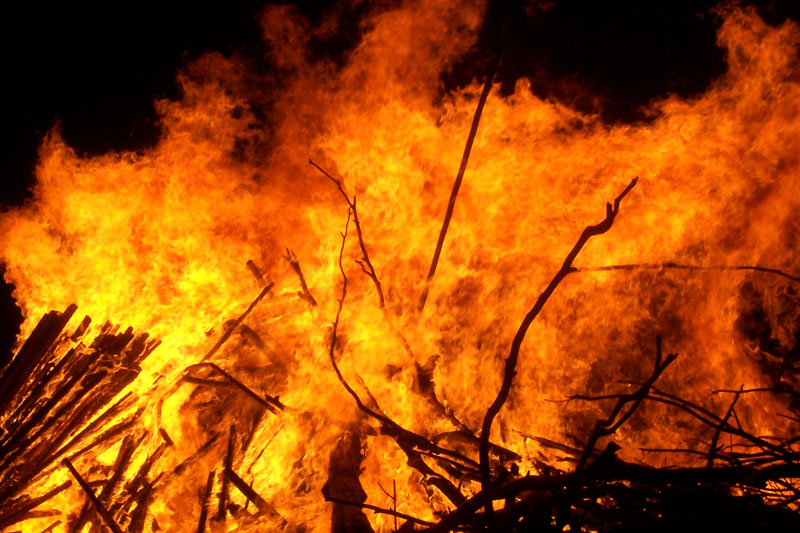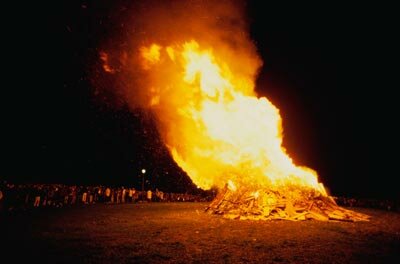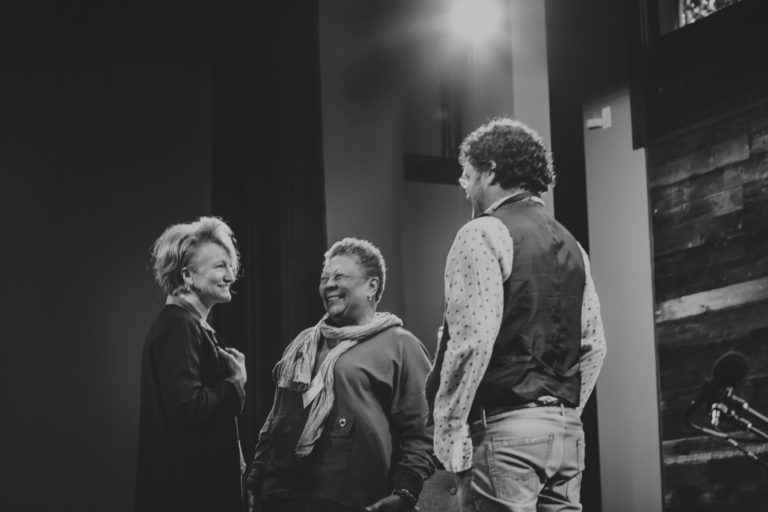“The world is cold. Someone must be on fire so that people can come
and put their cold hands and feet against that fire.” (Catherine Doherty)
and put their cold hands and feet against that fire.” (Catherine Doherty)
In our first reading – it is God who brings Moses so close, 40 days & nights, away from the Israelites up the holy mountain. When he goes back down finally, to confront their idolatry in the Golden Calf and their lack of patience, Moses glowed. You could say, that God lit Moses on fire for his people, to change them forever.
Moses received the 10 commandments from God, and because he was so on fire from that encounter, he constantly veiled his face with the Israelites because he glowed so much & they were afraid. Moses was that fire.
In our Gospel reading – again on a holy mountain God works God’s fire. Peter, James & John on the Holy Mountain had a most extraordinary experience with Jesus. Before them Jesus was transfigured… he glowed like fire and with him was Moses and the prophet Elijah… and Peter was so into the moment he wants to capture it, remain there, build huts for each of them but this experience would lead them onward, down the mountain, back into life, on the way to Jerusalem.
Jesus continued to share that fire with all he encountered; in healings, in miracles, in stories. Jesus was that fire. In turn, such fire was given to the disciples through the Holy Spirit to bring to the world.
3 centuries after Jesus, St. Ephraim the Syrian, would write a hymn on the Faith (c. 373):
See, Fire and Spirit in the womb that bore you!
See, Fire and Spirit in the river where you were baptized!
Fire and Spirit in our Baptism;
In the Bread and the Cup, Fire and Holy Spirit!
It is a fire of God that will warm this world. It is that fire that will burn inside us to reach out to our world. From our Baptism to Eucharist, God continues to kindle such fire in our lives to live out in the world.
11 centuries after St. Ephraim, Meister Eckhardt of the 14th Century would put it this way…
The more you let go of what you think is yours,
is the way toward seeing how it never was.
And the more you shed that self and its agenda,
the more you will see a spark of God grow, filling you…
To see such fire in our lives means letting go. Of our agenda, of ourselves, all that holds us back from truly living as God expects. So that with our lives today, that spark of God, can grow in us, and fed by those sacraments, we can become the fire we give to warm this cold world…
With Lent beginning this week, most of us, with the best of intentions, think about what we might give up during the coming season of prayer, fasting, and penance. We consider the usual: giving up a favorite food or an activity we enjoy to better our world. But would we consider giving up or curtailing a basic, necessary, everyday activity — like, say, driving?
A year ago, Kathleen Manning and her family decided to do just that: to drive as little as possible during Lent. It took the Manning family considerable planning to pull this off. Fortunately, Chicago has a city-wide transit system — it’s just a matter of using it. Both Mom and Dad could take the train to work; their daughter rides a bus to school. At the end of the school day, Mom can plop their two-year-old in his stroller to meet big sister.
Manning, who teaches history at Loyola University in Chicago, writes that the family’s “no driving” Lenten discipline got off to a rough start. Ash Wednesday was a cold, wet day. Running late, she drove to pick up her daughter rather than have her wait in the cold rain. And sacrificing driving required planning ahead, keeping everyone’s different schedules in sync.
But there were pluses: limiting food purchases to what could be carried home on the bus, being able to stop at the park on the walk home from school, making new friends on the trains and bus rides.
Kathleen Manning notes that driving less was not just a matter of penance but of making a necessary change in lifestyle.
Kathleen Manning writes “there is a challenge, albeit an implicit one, in ‘ashes to ashes, dust to dust’: How are we spending our brief time as not-dust? For me this has taken on a special urgency given the increasingly dire warnings about the ill effects of climate change and our vanishing ability to keep these affects at bay. When extreme droughts and catastrophic wildfires are turning parts of the world to ash, what do the ashes on my forehead call me to do?” U.S. Catholic Magazine [September 2019]
“it is grievously naïve to presume my actions make a difference in keeping an impending climate catastrophe at bay” but the Lenten season before us calls us to see our lives in need of change: a perspective that recognizes the fragility of our world; an understanding that all peoples and nations have a share of our good earth’s bounty; a respect for the dignity of every man, woman and child as made in God’s image and part of God’s grand creation.
Lent is a call to be transformed: to re-create our world in God’s vision of justice, mercy and peace. Consider making Lent 2020 a season for changing and transforming some part of your life to reflect a more just, a more reconciling, a more compassionate approach to life: unplugging from the world to make a better connection with family; ceding control to enable others to realize their gifts and hopes; changing the everyday tasks we take for granted to be more responsible in the care of the environment and for one another. Make this Lent a season of transformation, a change in your life and lifestyle, to bring God’s fire to the world.
(From the desert fathers/mothers) Abba Lot went to see Abba Joseph and said to him, “Abba, as far as I can I say my Little Office. I fast a little. I pray. I meditate. I live in peace and as far as I can. I purify my thoughts. What else am I to do?” Then the old man stood up, stretched his hands towards heaven and his fingers became like ten lamps of fire, and he said to him, “If you will, you can become all flame.”
By the Spirit’s leading, may we become all flame for our world, bringing love to warm our cold world. Amen.





